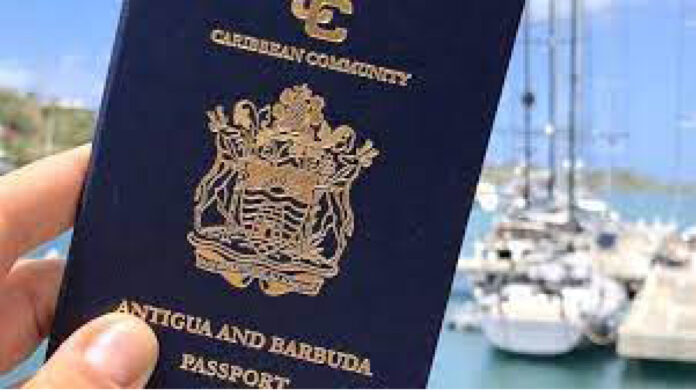Controversy has surrounded the country’s citizenship by investment scheme since its launch in 2013. While government says passport sales add vital dollars to public coffers, critics say the revenue is not translating to tangible benefits. In the first of a three-part series by Observer’s Theresa Goodwin, we take a closer look at precisely how CIP revenue in Antigua and Barbuda is being spent.
By Theresa Goodwin
Private catering for Cabinet ministers, outstanding payments to Carnival performers, and propping up the budget for statutory corporations. Those are just some of the expenses paid in the space of a few months via revenue from the country’s citizenship by investment (CIP) programme.
These details are revealed in an in-depth investigative piece recently released by the Caribbean Investigative Journalism Network (CIJN) in collaboration with the Media Institute of the Caribbean (MIC)
Observer’s Theresa Goodwin was part of a three-member team that filed the report for Antigua and Barbuda.
The team was able to obtain CIP reports covering the first half of 2020 and 2021 from Parliament as they were unavailable on the scheme’s official website.
The reports CIJN was able to retrieve revealed that “hundreds of thousands of US dollars were used to prop up the pension plan every month”, among other things.
“More than EC$500,000 in CIP funds were used to shore up the regional air carrier LIAT. The airline suffered losses directly related to the decline in tourism,” it continued.
“There were significant expenditures directly related to the Covid-19 pandemic during that 12-month period between 2020 and 2021,” CIJN said.
According to a July 2020 CIP report, Cabinet approved the spending of EC$25,000 for catering at a popular city restaurant for Cabinet members. It is not clear when precisely the gathering was held.
Two days later, Cabinet approved EC$200,000 to settle “outstanding prize monies” from Carnival celebrations.
Other entries indicated CIP funds had been used to repair a compressor in a judge’s chambers and pay for a satellite navigation system for the Survey and Mapping Division, while EC$183,934.22 was spent on tuition for maritime students studying in Jamaica.
The sum of EC$135,000 and more was also approved by Cabinet to replace computers in government ministries.
On September 9 2022, EC$608 was spent on raffle books from a local printing company. On several occasions, monies were also used to supplement the budget for a number of statutory bodies – including Social Security and the St John’s Development Corporation – along with fabric from a local store for the national garment factory, and a wire of EC$68,100 to two regional bodies namely CARICOM IMPACS and the Regional Security System to cover outstanding contributions for 2021, to name a few.
CIP funds have also been dipped into for emergency response to the Covid-19 pandemic. Millions of dollars were spent on medical supplies for the Ministry of Health, the procurement of a freezer van to store vaccines, the shipment of vaccines, plus various sums to equip government quarantine facilities.
CIP was set up in 2013 in a bid to increase foreign direct investment and provide an additional source of revenue for the government of the day. Over time, and with parliamentary changes, it has now become a main source of revenue for the ruling administration.
In his 2021 budget speech, Prime Minister Gaston Browne revealed that the programme had raised revenue amounting to EC$123.1 million – or about US$46 million – during 2021, an increase on the EC$115.7 million raised in 2020.
However, questions have been raised over why funds appear to have been spent indiscriminately over a lengthy period.
The main opposition party is concerned that the funds are being mismanaged.
Political Leader of the United Progressive Party (UPP) Harold Lovell told CIJN it was “foolish” to use CIP funds for recurrent government expenditure since CIP is dependent on the cooperation of other countries and thus susceptible to external factors.
According to Lovell the programme was intended to boost national development, not for the day-to-day expenses of the government.
“Unfortunately, it has not gone that way,” lamented Lovell. “They have basically just commingled all the funds, just thrown everything in a pot, so what we now have is a situation where you cannot point to anything and say, as a result of the CIP programme we have a hospital, we have a school, we have a new highway or anything like that.
“What we can say is that they have used it to fund regular government expenses,” Lovell told CIJN.
By contrast, in Dominica for example, CIP funds have been used to finance large-scale efforts ranging from post-Hurricane Maria recovery to infrastructure works and employment initiatives.
Revenues from St Lucia’s programme have largely been spent on disaster response and assisting farmers, while authorities in Grenada have focused on general budget financing, including contingency spending, natural disaster response, and debt reduction.
However, Antigua and Barbuda’s programme, Prime Minister Gaston Browne told CIJN, only makes up about 10 percent of the country’s total revenue – in contrast to the larger percentages seen in other countries with similar schemes.
“It’s an important source of revenue, but at 10 percent I would not say that we’re over-reliant,” Browne said.
“There are many other countries in the OECS sub-region in which CIP would have counted up to maybe 50 percent of the total revenue. I mean, those countries (are) clearly far too reliant on CIP,” he added.

